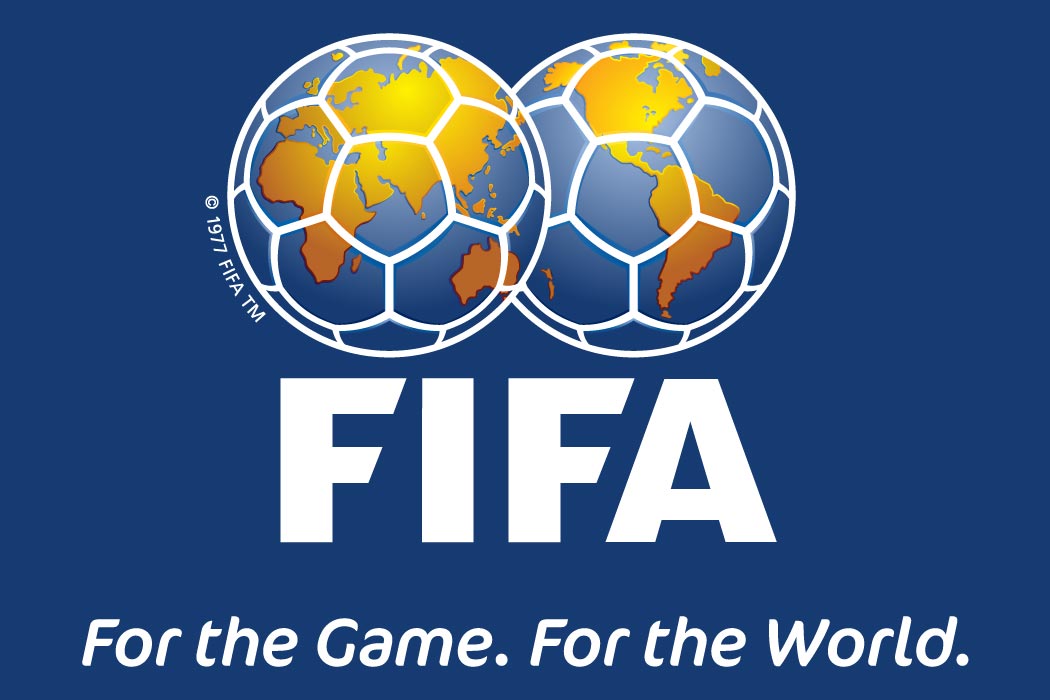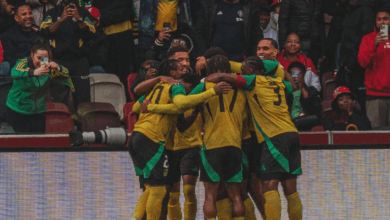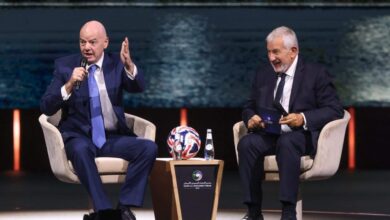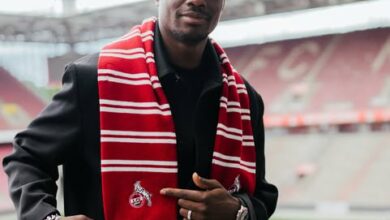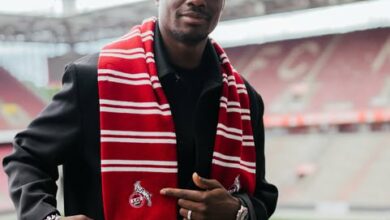Football in Africa: How Far From Home?
It is believed that Africa has produced lots of great players from the current Liberian President, George Oppong Weah, Abedi Pele, Eto’o Fils to Mohamed Salah and yet we lag behind when it comes to the development of the game.
Players like George Oppong Weah, the only African player to win the FIFA Ballon D’or and CAF Player of the Year in 1995 dominated the game in his day while Abedi Ayew Pele won the African Player of the Year three consecutive times. Samuel Eto’o in his day won African Player of the Year award four times and in 2011 was the world’s highest paid player.
Players like George Oppong Weah, the only African player to win the FIFA Ballon D’or and CAF Player of the Year in 1995 dominated the game in his day while Abedi Ayew Pele won the African Player of the Year three consecutive times. Samuel Eto’o in his day won African Player of the Year award four times and in 2011 was the world’s highest paid player.
From national teams to club football, we have always flattered to deceive.
Since the World Cup started in 1930, no African team has made it past the quarter finals. The Club World Cup has also been a nightmare to our continental clubs.
Although no other continents have won the World Cup apart from Europe and South America, the quality of players and teams Africa has produced all this while makes one wonder why we haven’t won any of these laurels.
In all the twenty one editions of the FIFA World Cup, Europe has produced five different winners i.e Germany and Italy (four times each), France (twice), England and Spain, one apiece.
Confederación Sudamericana de Fútbol (CONMEBOL) of the South American region boasts nine triumphs between them. Brazil, the most successful having won five times with Argentina and Uruguay winning twice each.
The Asians boast of a semi final berth while the Confederation of Central and Northern America (CONCACAF) has also tasted the semi finals as well.
With the greatest of respect to both Asia and CONCACAF, Africa has produced quality players ahead of those two regions.
In a recent publication from the International Federation for Football History and Statistics (IFFHS), Africa was ranked the highest exporter of footballers in the World with Nigeria and Ghana making the top ten.
This brings us to the question of what our problems are as a continent?
Finance
In January 2017, The Chinese National Bureau of Statistics announced official data on the growth of China’s sport’s industry for 2016, showing a total output of 1.9 trillion yuan ($295 billion), and an 11.1% growth that outpaced the recovering national economy.
This wasn’t achieved on a silver platter as the government planned to build an $813 billion sports industry by 2025 starting from 2010.
In the United Kingdom, the Premier League became popular after a £200 million pounds investment was done by the government into the Premier League and the government continues to do support the league.
In Spain, the government has helped clubs like Real Madrid with loans in difficult times and no wonder, football contributes immensely to the Spanish Gross Domestic Product (GDP).
The Brazilian economy has also been very strong, thanks to their massive export of players to Europe where a Brazilian player can cost as high as $ 60 million.
Although some African governments like South Africa have done their part in the development of the game, a vast majority of African countries ignores the industry.
The concentration of most African governments in sports is mainly on the senior national football teams where they can score political points and normally call it a presidential project.
Ignorance and lack of investment in the grassroots has has been a major factor affecting our game in Africa. It appears we forget that we need a strong foundation in order to reach the ultimate goal of making our game the envy of others. We should bear in mind that “you can’t build a house starting from the roof.”
Transportation
In the western world, there is a variety of transport options available to them however in Africa, most transportation is by road. Due to the bad nature of the roads, a journey of four hours will take seven hours due to the bad nature of the roads.
Meanwhile, the railway sector is nothing to write home about and in some countries its even non existent. The colonisation of African states was done by various western countries and used different measurements for the rail lines.
After independence, our governments have failed to adjust to the new technologies and developments and also standardising our railway system in Africa. This means, a train can not travel from Ghana to say neighbouring Burkina Faso and flights within and between African countries are very expensive and can be irritating. You sometimes have to fly through Europe in order to enter North Africa.
This irritating situation is most obvious when you have to cover World Cup and African cup qualifiers or international friendlies. In club football, it’s even worse. Road accidents resulting in the deaths of footballers and fans are rampant. In Nigeria, Ghana and other African countries lives of both fans and players have been lost due to road accidents.
Political Influence
Our game has become so political that the selection of national team coaches and players are sometimes influenced by our politicians. In Ghana, it is widely believed that the selection of former Black Stars coach, James Akwesi Appiah was highly political with former president John Agyekum Kuffour and majority leader Osei Kyei Mensah Bonsu all opting for a local coach when the criteria for selection had not been laid out.
It went beyond that when President Akufo-Addo asked Asamoah Gyan to make himself available for selection for the 2019 AFCON in Egypt at a time that Asamoah Gyan was threatening to stay out of the team because he had been relived of the captaincy.
National team coaches like Ibrahim Camara of Ivory Coast, Sunday Oliseh and late Stephen Keshie of Nigeria either benefited from political patronage or fell victim to political influence.
The Egyptian National Men’s Football Team has not risen since their dominance in the AFCON from 2006 – 2010. Why? Political influence during the 2011 uprising in Egypt where a section of the populace believed coach Hassan Shehata was associated to the Muslim Brotherhood and was forced to leave his post. The famous Mohamed Mohamed Mohamed Aboutrika continues to be in exile on suspicion that he sympathised with the Muslim Brotherhood.
Who heads the various associations and federations has also been of interest to African governments. Nigeria has had issues with FIFA as to who becomes the president of the Nigeria Football Federation (NFF). While the Nigerian government wanted Chris Giwa, FIFA said Amaju Pinnick is the elected president. In Cameroon, the government has issues with Iya Mohammed over embezzlement and misappropriation of funds. This is Africa!
Lack of Transparency
In 2016, Transparency International’s Global Corruption Report highlighted that Africa is vulnerable to serious reputational risk across all sports and the continent is already compromised by corruption.
The report highlighted serious gap in accountability which includes:
i. Undemocratic process in regional elections within The Confederation of African Football (CAF)
ii. Abuse of elections to national football associations (Zimbabwe)
iii. Mismanagement of player bonuses (Nigeria, Cameroon, Togo, Ghana)
iv. Alleged misapplication of funds (Kenya, Zimbabwe)
v. Systematic doping (Kenya)
vi. Match-fixing (All Africa, including Nigeria, South Africa, Zimbabwe)
vii. Human trafficking (Cameroon)
The Football Governance League Table also revealed that only Egypt Football Association made its financial records accessible online, while CAF have no code of ethics or commission.
Samuel Kimeu, executive director of Transparency International Kenya, once said “Building integrity in sports is not an option and so sports organisations should demonstrate accountability to all its stakeholders including their membership, athletes and fans…corrupt sports officials are not just stealing money, they are also stealing the future of our youth, the future of our athletes and the future of our sports.”
A report by the Forum of African Investigative Reporters (FAIR) labels football administrators as corrupt, greedy and inefficient administrators who only focus on personal gains.
Lack of infrastructure
The African Cup of Nations (AFCON) couldn’t expand to 24 teams until 2019 because the former CAF president Issa Hayatou believed Africa that lacked the necessary infrastructure.
The African Cup of Nations started in 1957 in Sudan, three years before the European Championship begun yet the gap in both tournaments is an anathema to Africans.
Government’s interest in infrastructural development has been the turn around for most top leagues in the world as clubs can’t bear the cost of building and maintaining their own stadium. The question remains, how do athletes develop when there are no training facilities or infrastructure?
Sponsorship, prize money, stadia, broadcasting in Africa, etc is way below the Europeans and South Americans. Zimbabwe couldn’t host the 2000 AFCON due to lack of infrastructure while the 2019 edition was given to Egypt after Cameroon couldn’t meet CAF’s specifications.
The Serie A in Italy is regarded as one of the best Leagues in the world yet only three clubs have their own stadia i.e. Sassuolo, Udinese and Juventus.
Government’s interest in infrastructural development has been the turn around for most top leagues in the world as clubs can’t bear the cost of building and maintaining their own stadium. The question remains, how do athletes develop when there are no training facilities or infrastructure?
Fake Football Agents
Hundreds of young African players continue to be trafficked in Europe and other continents each year with the promise of big clubs only to end up sold into prostitution from the agents who brought them to Europe.
Families of many young soccer players fall victim to these fake agents and go to the extent of selling their properties and using their life savings to pay the agents for visa and travel expenses in exchange for promises of rich contracts with the biggest clubs in the western world.
From the streets of Ankara, Turkey through Brussels, Belgium to Dhaka, Bangladesh, young African soccer players are stranded. The sad story of a twenty-four year old Nigerian, Moshood Afolabi in the Mongolian capital of Ulaanbaatar will make you cry. There are thousands of young African players are all over the world with similar stories, who were destined for greatness but have seen their dreams flounder future due to these fake agents. Their hopes of playing for the best clubs and representing their nations in major tournaments absolutely shattered.
Lack of Respect
Some Africans have the attitude of demeaning themselves and thinking that they are not capable of doing anything good. We have always opted for white coaches no matter how incompetent they may be. Once it’s a white coach, we are fine.
The 2010 World Cup in South Africa was a litmus test for Africa on this issue. Six countries qualified from Africa and as usual failed woefully to make any signficant progress apart from Ghana who advanced to the quarter final. Although our failure to perform at the World Cup have been enormous, some things certain African countries did prior to the Mundial were sad.
Nigeria replaced Shaibu Amodu who had led them through the qualifiers with Lars Lagerback days after the latter had failed to qualify his native Sweden for the World Cup.
The Ivorian’s did same by appointing Sven Goran Eriksson ahead of their own Georges Kouadio after they had already qualified for the event.
Eriksson signed a contract on 28th March 2010, less than three months to the World Cup. The results? Disgraceful! He left a week after their group stage exit with a huge sum of money. Agreeing to be their coach alone guaranteed him £270,000. The salary? Your guess is as good as mine.
Carlos Alberto Perreira, a coach who is past his prime was appointed in October 2009 to lead the South African national team to the World Cup as host nation. With Carlos Alberto earning more than $200,000 a month, the Bafana Bafana failed to progress past the group stage.
At club level the abuse and disrespect local coaches get is a big worry. Some are not even given contracts to sign with some club administrators openly abusing them.
In the appointment of national team and club coaches, some administrators openly tag local coaches as unworthy of trust and so they shouldn’t be given contracts. In Africa, our local coaches are really intimidated.
This mentality has gone all the way to affect player selection for our national teams as well. A foreign based player will always get the advantage over a local based player even if he plays in division three while the home based player plays in the local top division. To my people, a local player will always remain a local player no matter how good he or she is.
This is where i doff my heart for the Egyptians. They have always relied on local players in the Egyptian Premier League for their national team. Their dominance from 2006 to 2010 is a clear example of this.
Hooliganism and Superstition
The first recorded instances of football hooliganism in the modern game allegedly occurred during the 1880’s in England, a period when gangs of supporters would intimidate neighbourhoods in addition to attacking referees, opposing supporters and players.
In Africa hooliganism has caused loss of lives. Instances of hooliganism in the African game include Kaiser Chiefs versus Free State Stars in South Africa in April 2018, Gor Mahia versus AFC Leopards in Kenya and many more. In Ghana, the May 9 disaster remains a clear reminder.
Some years ago, in Nigeria, Kadiri Ikhana led Enyimba FC of Aba to a league match in Kaduna. He returned to Aba limping after his legs were badly damaged following an attack by hooligans in Kaduna.
Ask referee Charles Paul Umuagu and his assistants, Auwalu Barau and Abdulwaheed Dauda in Nigeria and you will never dream of becoming a referee in Africa. In Botswana, the chairperson of the Central Region Referees Association (CRRA) Thapelo Lefu, in 2016 said women are reluctant to venture into match officiating due to abusive language, bullying and beating by fans.
The national teams have all had their share of hooliganism. The fighting in the Senegal verses Gambia game in 2003 sparked days of rioting in Dakar, Banjul and major towns in both countries as rival supporters took their vengeance on their opponents and their businesses.
As the saying goes, life is more precious than gold and no one is willing to sacrifice his life for a football game so lots of people refuse to go to the stadium for games of the fear of losing their lives.
With issues of superstition, teams urinate on pitches and dressing rooms with the motive of casting out any evil intentions towards them. They go to the extent of spending lots of money to do with whatever it takes spiritually to win a game and some end up with no money to pay players.
In Kampala, Rwandan players were beaten mercilessly by police after a fight developed with their Ugandan hosts when they were accused of performing witchcraft. Superstition? Ask Zaire (now DR Congo) what happened in the 1974 World Cup and they will tell you more.
“We all need to help in changing some players mentality about using black power to destroy themselves and also make sure we instil discipline and respect for each other.”
Ghana finished 4th in the 2012 AFCON with Serbian tactician Goran Stevanovic and came back to Ghana to present his report to the Football Association. A copy of the leaked report cited by Goal.com states: “After losing to Zambia, there arose so many accusations amongst the players during my meeting with them. I have learnt great lessons from African football and also about Ghanaian players’ behaviour on and off the field.”
“We all need to help in changing some players mentality about using black power to destroy themselves and also make sure we instil discipline and respect for each other.”
Players refusing to play games because of and who goes on the pitch first are all believed to have spiritual connotations.
Recently in the Ghana premier League, Aduana Stars and Asante Kotoko both used ten players each instead of eleven in a game due to their superstitious beliefs.
Officiating
We can’t accept mistakes. You are a cheat and have been induced to sway the game in someone’s favour. That is how we interpret mistakes by officiating officials in our game. We have succeeded in tarnishing the image of our referees to the extent that only one referee, late Said Belqola (Morocco) continues to be the African referee to officiate in a FIFA World Cup (France 98).
Charity they say begins at home and for that matter if we have no trust in our officials we shouldn’t expect others to opine differently. Referees all over the world make mistakes in their careers.
The best referees Frank de Bleeckere, Howard Webb, Markus Merk, Pierluigi Collina all made mistakes in their careers. Retired Hungarian referee Sandor Puhl is regarded by many as one of the greatest ever in the field. He is however highly criticized in Spain due to his negligence at the 1994 World Cup quarter final between Italy and Spain where Mauro Tassotti elbowed Luis Enrique on the face in the penalty box during injury time leaving Enrique with a broken nose. Referee Puhl granted no penalty to Spain and didnt Tassotti even a yellow card.
Mark Clattenburg of England recently admitted to making a mistake that gave Real Madrid the 2016 UEFA Champions League trophy. While it’s a mistake elsewhere, it’s a crime in Africa for a referee to make a wrong call. So many referees have been subjected to humiliation and abuse thereby affecting their opportunity to officiate on some of the biggest stages.
Although some African referees have been banned for match manipulation and match fixing like Joseph Lamptey (Ghana), Aziz Nyirenda (Malawi) and others.
This has happened in Europe too. Armenian referee Andranik Arsenyan and his assistant Hovhannes Avagyan were banned for life for attempting to fix an Europa League game. It’s also happened in South America, Asia, Oceania, Central America and elsewhere.
Am not justifying it bad officiating, but, these are humans and we should admit they can make mistakes.Not all errors should therefore be translated as match fixing.
The journey has been long. From the first documented game played on the African continent in 1862 in South Africa, to 2020 in South Sudan, we have embarked on an incredible voyage.
We all hope to reach our destination one day. We all hope to match the Europeans and South Americans one day. We all hope to get there, but when?
So I ask, football in Africa, how far from home?
Mustapha Hadji (Dean of Sports)
 | ReplyForward |

